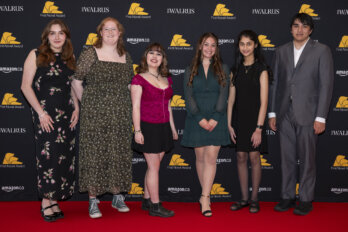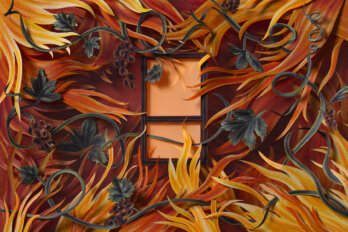Here beginneth a short treatise of contemplation taken from the Book of Alice Nash, Ancress of Shere, c. AD 1372.
Before we leave, we tell You—smoke kestrel, thumb sky. But since friend Nance’s murder, our words a poor magic mashed to this world. Then we are off our knees. We sneeze and admit Mam’s relief at our leave-taking. She wants no mob here, poxed cursers seeking to lay blame and wreak vengeance for our imagined sins. We smudge a tear from young Bea’s cheek. Boy, we say to young Robert. A curtsy for Pa mute from the Long Wars. We hold back a sneeze. The sun fights a cloud. The old donkey’s nose dabbles air, and he twitches his flied flank. From cousins Matilda and Joan, one hill over, two quick waves. We scan the second hill, the third. No Nance.
We sling up our pack.
Wind on the mountain passes. Yesterday our feet froze and thawed and a swift hare defied a hawk. Yesterday we sang. We chopped firewood and slept hot.
Today we stumble, rock and root. Bound breasts ache. We miss Mam fretting over Bea’s coarse braids, Robert tossing his cap, off to tend the ewes. We miss the ewe called Rose.
We bear on. The hold of which Nance spoke lies in Surrey, a fortnight or more southeastward. But by evening our flasks dry. Even the donkey sucks his teeth. We pray You all night.
But our pleas stir the ash, and at grey light, the donkey heaves. We stroke his flattened ears, lean against the sweating neck. He buckles and barks, and sad to say we coax him forward with a stick while we trod alongside, the path sour with moss. Crows rattle bare branches. Their cries banner our thin thoughts.
At high sun, we sink, lick damp from rocks, pound dirt with fists. Call You with sorry sounds. Thistle girt, boat corn—we call You. But You are dark striking.
We remind You—to You we come. But You must already know. And our sorry sounds grow.
You must move us—for bless him, the donkey nips, we find our feet and soon the trees green. Violets sweet. We come to a low village where a mean tavern reeks, hurry to a ditch and drink.
For seven days and seven nights, we meet roads and winding lanes. And once, a three-legged dog with a cold searching nose the donkey does its best to bite. Where stoves blast, we beg, we eat. When Richards ask favours, we beg off. When a Margery with head scabs asks us, we head shake. Once, three robbers with sacks command us. But with three fleet axe swings, born of our hard-chore years, that’s that.
We wade through fields at dusk, and does’ gold scalds our eyes. Once, we spy a dead fawn by a creek, hide scaling with beetles and worms while a thrush throats.
All this Your work. O You in all things, behold we come. To You we come.
And behold, tomorrow is another day.
Eighth night. We bed by a stream, bid mild sleep as the donkey snores. And fear not, for all is well, You evermore though mountains might bolt and seas surge. We tell ourselves. For as our lids grow heavy, the stream courses purple. And for each child rhyme that we garble for solace, sparks spit strange sights. Crimson flocks taking flight from bleeding hills, from plague cursers wagging knives. Nance shouting, Run, Alice, run. And Alice did run, head gibbering like loose heavens. Until she dared halt and look back. Red halos. Cries of Infidels.
Run, Alice. Streaming these red thoughts.
But fear not. For all is You. The spell ends. Heavens settle, water calms. We must go far, for Nance. For You.
For now, we roll over, pretend snore in case that hastens rest. A good armpit scratch never hurt. Nor a hum to settle the chest. Soon two owls converse with the donkey’s dream snorts. And all is well. Only once, a sob chokes.
O Nance.
Nance taught far and wide. Toulouse to Narbonne, Beauvais to Bruges. Low-country towns around Flanders, Brabant. A drab English shire in spring. You see all, she preached, under a stewing rain in front of the eel monger’s that morning Alice first beheld her—Nance herself a miracle with cropped curls and sturdy shoulders and worldly in her knowledge and brave.
On an August afternoon, she and Alice lay together in the meadow foxtail and herd’s grass which caused eye water and sneezes, but the sun streamed. Bees clustered in clover. You in all things.
In my rough heart too, Nance?
In your heart too, Alice.
Who dared draw head to Nance’s browned bosom. In this, Nance?
Her chapped hand stroked Alice’s neck, and a breeze purred like Mam’s ginger cat. This too, Alice.
Thereafter in the shade of a blackberry bush, stained lips pressing. Heat sheeting strong backs and buttocks and knees. In the season’s awe light, the year swinging stout, fattening with gifts of early evening brilliants, of which Nance taught.
So much to come, we thought. For You.
On whose behalf the cursers believed they came. Early fall. West Hill where true loves Nance and Alice dallied. Kickers and stabbers, behold. You in all things.
In Nance who now lives on in Alice.
We reach a day of nights and days too numerous to tell. Swim streams, solve riddles, open gates.
At last arrive—we arrive, we tell You, in case you don’t already know.
The church rubbles. As Nance had warned, describing her travels among such poverty. And so soon we beg mercy of the devout one who greets us. Who appears gaunt and confused. Neck craning, scanning to our sides, behind us. Asking, Is there another of you? when we put forth our case. Since when Nance died Alice became Nance too. For You.
At last, we offer all we own beyond ourselves—our poor beast as payment for scant keep. Though we are sad to see the donkey go.
At last, we trip on crumbling brick and sneeze dust through dark corridors. A great door’s hinges creak. Behold a dim room. Ailbertine the Tall—do You know her? We sneeze and wait while she rises from behind a desk, shakes out her black threadbares like a proud old crow.
She will think on us.
We wait on the chapel bench, splinters in our palms. We sneeze and sing songs. At last, sleep.
Next morning, Ailbertine towers. Kneel in the garden, she bids, her voice high. Tend the Lord’s carrot blight.
But our donkey. In return, we must gain the cell.
But Ailbertine says even higher. Nineteen years now Cecily holds it. What you desire you will not have. Not while Cecily lives.
We wonder, Was Nance wrong? Are we?
Forgive us then, we say, figuring at least one thing fast. But with respect we request the donkey back.
Ailbertine draws ever taller. A long moment, then a withered hand grants a head prick with a long yellow claw. Bring Cecily her weekly suppers, Ailbertine commands. Collect such body soils as might depend. Hear your Lord speak thus.
We do. For You, we yank weeds and coddle weak sprouts. Fetch Cecily her gruel. Once a week, empty her chamber pan.
And do You know Cecily too? Know that one day past three weeks since we arrived, a bad pea kills her.
Know Nance was right.
At last, we are on our knees by our cell’s window squint. And all is well evermore, we pray You—sun spoon, blue bake.
Until a spider webs her prey by the inner casement and, with her enterprise, our hunger swells. Bless us—we have defecated but twice this first month.
We stand and the flagstones spin. Nance in her green dress lies down, and we lie too.
Is Nance not gone?
A feathered crow alights the outer casement of our cell’s window and beaks a stone. Cecily, returning?
We lick dry lips and wonder. Is this how You speak? Between the living and the dead? On a hill, spiralling like Bea’s beloved toy top, cousins Joan and Matilda start up. And Alice once among them with Mam and Pa.
We wonder. If Nance in her green dress still lies down, can Alice lie too, lie yet with Nance? Or must we continue to run, Alice, run. Until like a top we too, twist to fog.
And Cecily, does she walk, might she return, in what state? A pea for a pea in a pale shivery hand?
Alone, nowhere else to go, we ask and ask our questions.
Maybe You don’t know.
A day, a night, another day or more. At last, the spell clears. We kneel again in our cell—so low, dirt humbles our lips. But our hunger gains teeth and nails and slinks.
Forgive this. Forgive this. And nothing else.
On a night of nights too long to tell, key and lock and door scrape. Behold Ailbertine bearing a torch. Bless, she squeaks.
We hop in place, clap hands to warm, sneeze. While, in the torchlight, a smile crooks the woman’s mouth like a hook. We’d almost forgotten such highness. Bless, we sneer back.
She steps closer, and we get three head cuffs. One sharp kiss, which stinks of rancid meat. Our heart hammers for our old braying beast.
You spared us for this? And the weekly oatcake. The swig of water. Coins sometimes tossed at our squint by pilgrims seeking counsel. Let the light scald your eyes, we bid them. Angered, some ask for their coins’ return.
Yes, bless, Ailbertine squawks. The old rich silversmith and his young love. Their sickly child. Thus put your nonsense to godly use, or suffer casting back into the world.
Where Nance lies down and Alice lies too? And all is well evermore. Until all is not.
Or remain here, where for her passion, poor Cecily met an inglorious end. For which we truly repent. Her end we could meet too. For love of You?
Run, Nance shouts.
Let the light scald Your eyes.
Now we reach a day of days too pitiful to tell. At last a beach by a cliff. We crouch against a rock for hours, let terns tangle our hair, pull the wool from our cloak. Scavenging the water’s edge for a time near nightfall, a woman in black rags like an old crow, but not one we know. Then, for a time, we toe freeze in salt suck. Then knee and hip with breath catch, stones tied to our hem. Until neck soak, when in between sudden sneezes we face tilt. And behold the star bones of sky heroes revealed by bold true Nance.
A boulder beyond wave’s reach shelters our coldest night.
Next day, old crow from the night before, with a big steaming pot.
Sage moan, cape band. Sea cave and blanket and tide. Gulps of gull soup. When darkness tucks around us, we touch ourselves to sleep. Fetch terns’ eggs with each dawn. On clear evenings beneath the Mariner’s brights, we dare point to the skies as Nance once did.
Constellations never before told. Here, Taker of Biddy Tolls in Wayfarer Tales. There, Digger of Fine Dusts for Scents. And here, Maker of Dab Purses, Best Baker of Delicate Loaves. There, Measurer of the Village Wells.
Another night now. Before we leave again we tell You, behold. Here, Keeper in Her Lighthouse Several Borders North. Above You, Sailor in Her Star Throne—in a time not yet come. But just You wait.
Is this how we speak? Can You hear? Simple Alice, whom Nance loved. Hear how we are Nance too.





